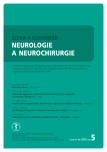Neurological Complications of Dengue – a Potential Threat for Central Europe
Authors:
M. Salavec 1; V. Boštíková 2
; Z. Blechová 3; R. Sleha 2; S. Plíšek 4; P. Boštík 4,5
Authors‘ workplace:
Klinika nemocí kožních a pohlavních LF UK a FN Hradec Králové
1; Katedra epidemiologie, Fakulta vojenského zdravotnictví UO, Hradec Králové
2; Klinika infekčních, parazitárních a tropických nemocí, Nemocnice Na Bulovce, Praha
3; Klinika infekčních nemocí LF UK a FN Hradec Králové
4; Centrum pokročilých studií, Fakulta vojenského zdravotnictví UO, Hradec Králové
5
Published in:
Cesk Slov Neurol N 2013; 76/109(5): 592-595
Category:
Review Article
Podpořeno grantem MO FVZ 0000502.
Overview
Dengue is an acute viral infection transmitted by Aedes mosquitoes. The disease is endemic in tropical and subtropical countries and, until recently, was considered to be exclusively an imported infection in Europe. However, this picture is changing, as there have been cases of autochtonous dengue reported in France and Croatia in 2010 and on Madeira in 2012. In addition, neurological complications are seen more frequently and in an increasing number of forms. Although this disease affects both sexes and people from all age groups, neurological complications are the most frequently diagnosed in children. Correct diagnosis can pose a problem in our geographical area due to a lack of experience with the disease on one hand and atypical disease symptomatology in our patients compared to those observed in patients from the original endemic areas on the other. Dengue can become a serious problem in our region, mainly due to gradual spread of the vector from the original areas northwards; rapid and correct diagnosis of such cases is of great importance.
Key words:
dengue fever – dengue hemorrhagic fever – dengue shock syndrome
The authors declare they have no potential conflicts of interest concerning drugs, products, or services used in the study.
The Editorial Board declares that the manuscript met the ICMJE “uniform requirements” for biomedical papers.
Sources
1. Guzmán MG, Kourí G. Dengue: an update. Lancet Infect Dis 2002; 2(1): 33– 42.
2. Ranjit S, Kissoon N. Dengue hemorrhagic fever and shock syndromes. Pediatr Crit Care Med 2011; 12(1): 90– 100.
3. Kumaria R. Correlation of disease spectrum among four dengue serotypes: a five years hospital based study from India. Braz J Infect Dis 2010; 14(2): 141– 146.
4. Jelinek T. Dengue fever in international travelers. Clin Infect Dis 2000; 31(1): 144– 147.
5. Kitron U. Risk maps: Transmission and burden of vector borne diseases. Parasitology Today 2000; 16(8): 324– 325.
6. Channa R, Wasay M. Central nervous system involvement in dengue viral infection. Pak J Neurol Sci 2006; 1(2): 84– 88.
7. Kankirawatana P, Chokephaibulkit K, Puthavathana P,Yoksan S, Apitanapong S, Pongthapisit V. Dengue infection presenting with central nervous system manifestation. J Child Neurol 2000; 15(8): 544– 547.
8. Jelinek T. Trends in the epidemiology of dengue fever and their relevance for importtaion to Europe. Euro Surveill 2009; 14(25): 19250.
9. Lambrechts L, Scott TW, Gubler DJ. Consequences of the expanding global distribution of Aedes albopictus for dengue virus transmission. PLoS Negl Trop Dis 2010; 4(5): e646.
10. Sousa CA, Clairouin M, Seixas G, Viveiros B, Novo MT, Silva AC et al. Ongoing outbreak of dengue type 1in the autonomous region of Madeira, Portugal: preliminary report. Euro Surveill 2012;17(49): 20333.
11. Marí RB, Peydró RJ. Re‑ emergence of malaria and dengue in Europe. Curr Trop Med Int Health 2012; 12(9): 483–512.
12. Centers for Disease Control and Prevention.gov [on‑line]. Available from URL: www.cdc.gov.
13. World Health Organization.int [on‑line]. Available from URL: www.who.int.
14. Sebesta O, Rudolf I, Betasova L, Pesko J, Hubalek Z. An invasive mosquito species Aedes albopictus found in the Czech republic. Euro Surveill 2012; 17(43): 20301.
15. Zelena H. Importovane arbovirove infekce. Zpravodaj Centra klinickych laboratori 2009; 1(5): 4– 5.
16. Brede HD. Dengue‑ Fieber. Munch Med Wschr 1995; 137: 821– 822.
17. Miagostovich MP, Ramos RG, Nicol AF, Nogueira RM, Cuzzi‑ Maya T, Oliveira AV et al. Retrospective study on dengue fatal cases. Clin Neuropathology 1997; 16(4): 204– 208.
18. Gubler DJ. Dengue and Dengue hemorrhagic fever. Willingford, UK: CAB International 1997: 1– 22.
19. Nimmannitya S. Clinical spectrum and management of dengue hemorrhagic fever. South Asian J Tropical Med Pub Health 1987; 18(3): 392– 397.
20. Kulkarni ML, Kumar S. Involvement of the central nervous system in dengue fever and its outcome. Dengue Bull 2011; 35: 52– 64.
21. Wichmann O, Mühlberger N, Jelinek T. Dengue – the underestimated risk in travellers. Dengue Bull 2003; 27: 126– 132.
22. Gulati S, Maheshwari A. Atypical manifestation of dengue. Trop Med Int Health 2007; 12(9): 1087– 1095.
23. Misra UK, Kalita J, Syam UK, Dhole TN. Neurological manifestations of dengue infection. Lancet 2000; 25(355): 1053– 1059.
24. Solomon T, Dung NM, Vaughn DW, Kneen R, Thao LT, Raengsakulrach B et al. Neurologic manifestations of dengue infection. Lancet 2000; 355(9209): 1053– 1059.
25. Státní zdravotní ústav.cz [on-line]. Available from URL: www.szu.cz
26. Lexová P, Králová R, Tkadlecová H, Písková I. Horečka Dengue – výskyt autochtonních onemocnění ve Francii. Zprávy epidemiologie a mikrobiologie 2010; 19(8): 24– 28.
27. Soares CN, Faria LC, Peralta JM, Freitas MRG, Puccioni‑ Sohler M. Dengue infection: neurological manifestation and cerebrospinal fluid analysis. J Neurol Sci 2006; 249(1): 19– 24.
Labels
Paediatric neurology Neurosurgery NeurologyArticle was published in
Czech and Slovak Neurology and Neurosurgery

2013 Issue 5
Most read in this issue
- Wilson Disease
- Glioblastoma Multiforme – a Review of Pathogenesis, Biomarkers and Therapeutic Perspectives
- Tumefactive Variant of Multiple Sclerosis – Two Case Reports
- The 3F Test Dysarthric Profile – Normative Speach Values in Czech
